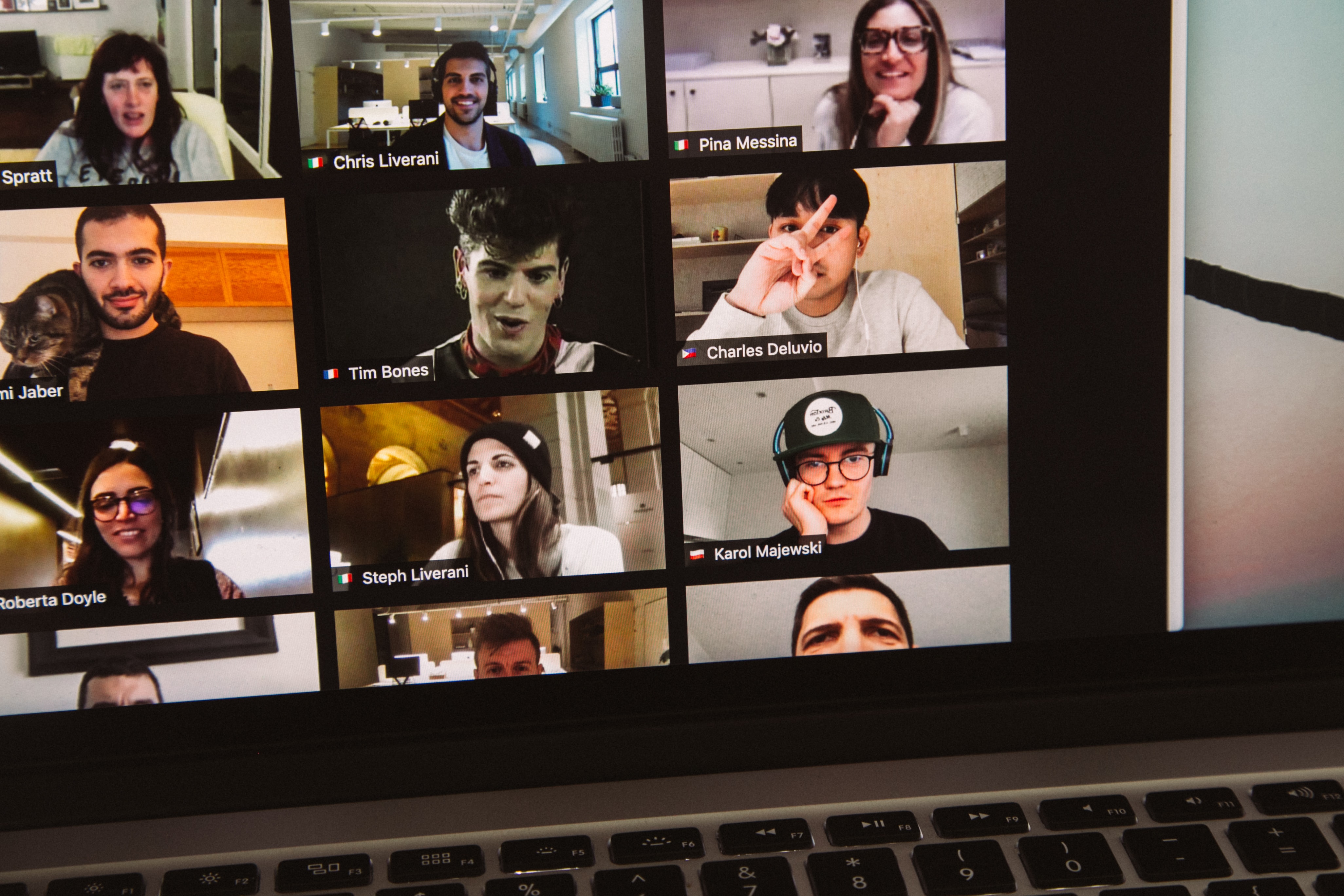Over the last few years, conference calls have become a very normal part of our day-to-day. For some, this is great news - you can have your notes on the screen, wear your slippers and turn your colleagues up when you need to. But for others, this brings a whole new set of anxieties to contend with - technical glitches, background noise, limited body language and feeling like the spotlight is more on you than it would be if you were face-to-face. As hard as we try to replicate in-person meetings, the unnatural setting of a virtual one brings challenges to even the most confident speakers. If the call isn't in your first language, this can be particularly challenging. Keep reading for some simple but effective tricks to stop the blank looks, avoid misunderstanding and overcome your conference call anxiety.
Conference call anxiety for non-native English speakers is a very modern, very real problem. Imagine the scene...
-
You know exactly what you want to say but you can't convey it in the same way as you would in your native language
-
Your colleagues politely smile and nod without actually understanding you
-
You avoid speaking up for fear of being misunderstood
-
Someone asks you to repeat something and it immediately makes you self-conscious about your accent
- You get blank looks and immediately realise you're not pronouncing something correctly
Sound familiar? You're not alone!
Before the conference call
Warm up your voice and body
Getting your vocal muscles warmed up is crucial for being ready to create new sounds effectively. It is important to use these techniques before a conference call to make sure you are articulating with clarity and there is no fuzziness in the mouth. Try this short warm up exercise for five minutes before the call:
- Place some imaginary bubbles on the ceiling with a nice crisp 'P' sound.
- Repeat this with 'B', 'M' and 'W'.
- Blow through your lips like a horse.
- With your teeth closed, spread your lips into a smile, and then put it into a pouting shape. Do this ten times.
- Put your lips into a pouting shape again, close and open them like a fish. Do this ten times.
- Make the sounds 'B', 'D' and 'G'. Make sure they are pronounced and muscular. Repeat them over and over again, getting faster each time. Now try it with the voiceless equivalent - 'P', 'T' and 'K'.
A little tension release prior to any virtual call will help your whole body to relax. Stand up straight and then roll down forwards to the floor (your back, head and arms) – then roll back up. Shake out your arms and give your jaw a light massage. Rather than having your hands by your sides or on the desk when you start the call, put them in line with your navel straight away, to show your body that you are mobile and ready to go. Subtle hand gestures can be useful in engaging people. Keep your face mobile and your shoulders relaxed.
 Visualise the call
Visualise the call
The power of visualisation is a proven method that does wonders when you've got an important conference call, presentation or speech coming up. The trick is to visualise every element of the event - sitting down at your desk, getting your notes ready, making sure your background is warm and welcoming, entering the call, the first moment before you speak, greeting everyone, the enraptured eyes of the audience, the enthusiastic nods and smiles throughout and the positive feedback at the end. This builds neural pathways of successful delivery in your brain, so that when you go to actually deliver your ideas, you are set up for success.
During the conference call
Set the listener up for success
People often avoid asking non-native English speakers to repeat themselves for fear of coming across as rude. Despite coming from a good place, this is not sustainable, as you'll end up making the same mistakes next time, and this can negatively impact whatever it is that you're trying to achieve. To overcome this, simply let the participant know at the beginning of the call that they can jump it at any point with questions, or if they need you to repeat yourself. If they do ask for clarification, don't feel disheartened. Be sure to slow down and enunciate your words, before checking in to make sure they definitely understand this time.
Ultimately, you're there to present your ideas, not prove yourself as a flawless English speaker. The way that you speak English is hardwired into your brain, and has been there for any number of years. It's better to bring whole self to the meeting, even if it means a half-formed sentence where you have to ask someone for a quick bit of translating help. Even native speakers do this all the time when they forget a particular word! They pause, turn to someone and ask, "what's the word for when you're xxxxx". This is far better than holding back an idea for fear of stumbling. Remember, your audience won't pick up on every mistake you make, and they don't know what you originally intended to say, if you end up forgetting a point. You can simply circle back later.
In the same way that you should ask native English speakers to repeat what's been said, it is also a good idea to paraphrase what you're saying. At the end of each point, find a way to say it in less detail, perhaps using different vocabulary to avoid mispronunciation issues.
Don't slow down, pause.
It's often hard to hear participants during a conference call, even when you all share the same native language. If you are feeling nervous about speaking, it can be easy to hurry through what you planned to say, but that does not treat your ideas with the respect they deserve. By being told to 'slow down', you are likely to lose your train of thought and passion. To manage your pace, use pauses. These don't have to come exclusively at a punctuation point. Instead, you can think of them like phrasing in music. They can break up a long sentence, pull out and frame important words, and generally bring melody to your speech. They act like a little beat that helps people digest your ideas. This is part of the basics of effective communication and is even more important when people with two different original languages are communicating.
To make sure you're putting the right energy into your words, follow these simple rules:
Vowels are the feeling part of the words. Take your time on them, using them as connectors so you speak at a slower pace and really engage with your listeners. When thinking about which vowels to lengthen or energise, you want to focus on the important words. They are the words that everyone needs to hear to really get your meaning. In every important word, there is only one syllable that really needs to be emphasised – and that is the stressed syllable. So this means you only need to lengthen one vowel sound. For example, it’s the OR in important.
Consonants are like the structural framework of the word. They create boundaries for the more fluid emotional energy of the vowel. There are two places where you really need to pronounce your consonants, because if you miss them out, it can either be difficult to understand or just really sound a bit off for the English ear:
1. Always pronounce the consonants at the end of a unit of thought, or before a pause - “I really do think this is good.”
2. Always pronounce the t’s and d’s in the middle of a word – “It really matters.”
Check in regularly
A common occurrence in meetings is that so many ideas are bounced around and opposing arguments discussed, that we forget which idea we settled on.
At the end of each point you make, check that your listeners have fully understood you. This can make all the difference when it comes to avoiding misunderstanding and reducing awkwardness. Phrases as simple as “Was that clear?”, “Any questions?” or "Do you agree?" will keep your audience alert and ready to respond. You can make it more interactive by directing questions at specific people - "What are your thoughts on that, Tom?" or "Is there anything you want to raise, Sofia?".
Just like how you should start the call by outlining the agenda, you should end it by running through a summary of what has been discussed. Make sure there are clear actions and deadlines, assigned to specific people on the call. If you're not leading the call, don't be afraid to ask for clarity on anything you might've missed during the call - we're only human and can't be expected to understand every tiny detail. Notes should be taken and emailed round to each participant, to ensure everyone is on the same page.
"Could you please clarify what you meant when you said XXXX?"
"I didn't quite catch that - can you say it again please?"
After the conference call
Make a note of new phrases
The beauty of teamworking is that we are constantly learning from each other. Even native English speakers learn more about their own language every day. We often use slang, colloquialisms and acronyms that you're not expected to know when you learn English as a second language. So why not keep a notebook on your desk for new words, phrases and idioms that your colleagues use in meetings, that you'd like to start understanding and using? Don't be afraid to ask for clarification about a certain expression - the more you do this, the faster you'll pick them up. Here are a few to start you off:
"To reinvent the wheel" - to waste a great deal of time or effort in creating something that already exists
"To touch base" - to briefly make or renew contact with someone
"Low-hanging fruit" - the most easily achieved of a set of tasks, measures, goals, etc
"Bread and butter" - the activity or work that provides the main part of their income
"To play devil's advocate" - to express an opinion which you may not agree with but which is very different from what other people have been saying.
.jpg?width=7952&name=linkedin-sales-solutions-1LyBcHrH4J8-unsplash%20(1).jpg)
Play the recording back
Taking the time to break down how things went is crucial to help you move forward. Once you've hit the 'End Meeting' button, make a note of what went well, and how things could be better next time. This isn't a time to beat yourself up. These days, lots of virtual calls are recorded. Recording a call not only ensures that you have a record of everything that was discussed during the call for your future reference, but it also gives you the opportunity to listen to and review your call at a later time. If you have a friend or colleague who can help, even better. Play a snippet of the meeting back to them, perhaps during a section that you felt the audience looked particularly unengaged, and ask for feedback on how you sounded - was each sound enunciated, were you mumbling, were you speaking too quickly, were there any words that you completely fluffed up the pronunciation of? There will be a handful of words that you commonly use that may be the biggest culprits in terms of getting in your way or leading to misunderstanding. If there are some that you know you are prone to mispronounce, then write them down and take ownership of them one by one.
Watch this video for of these gems, plus some top tips for native English speakers, to help the conference call run smoothly and make sure everyone is feeling comfortable and confident:
Accents are wonderful and important. They hold a major part of our identity. They contain our culture and our heritage, and it’s important and totally fundamental to hold onto that. When all is said and done, your value to the organisation is not dependent on how you pronounce a particular word, but in your creativity, expertise and passion. If someone speaks and doesn’t let any of their passion out into their words, then regardless of how correct the pronunciation is, or how perfect their accent is, people won’t want to listen. If someone speaks with passion, and injects their feelings and energy into the words then, even if some sounds or words are mispronounced, it will be compelling and engaging to listen to. So don’t get caught up thinking that your pronunciation may not be perfect therefore only half say it. It is 100% possible for you to be your vibrant, unique self on conference calls.
If you'd like to know more about how we can help you overcome barriers and transform your confidence, book a free 15-minute Discovery Call today.



